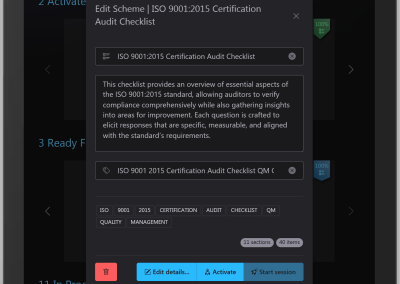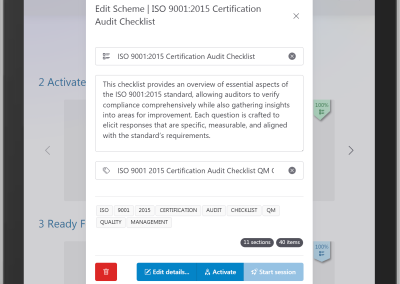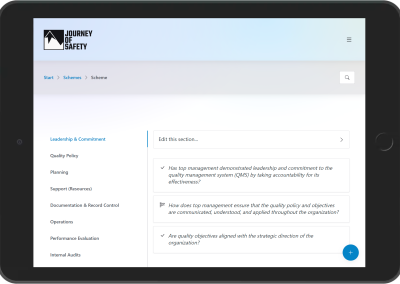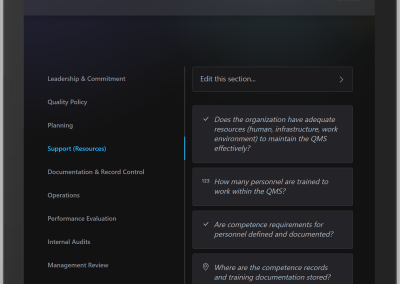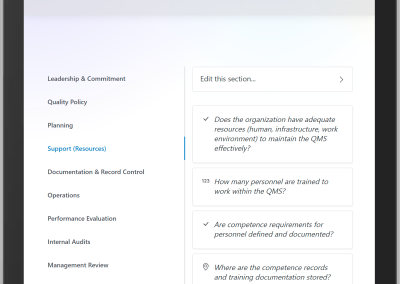ISO CERTIFICATION, THE NECESSITY AND ITS IMPORTANCE
What is ISO certification, what types are there, and how important is it for a company to have?
ISO certification is an internationally recognized standard that helps companies improve processes, quality, safety, and efficiency. It is issued by the International Organization for Standardization (ISO), and each ISO standard focuses on specific aspects of business operations. The Dutch Normalization Institute (NEN) translates these standards into the Dutch language.
Obtaining an ISO certificate is an intensive and comprehensive process during which the entire company is scrutinized by external auditors (those who carry out the ISO checklist). Although significant investments are sometimes required, many companies choose to get certified.
An ISO certification is a quality seal and leads to higher sales both in the short and long term. Companies that are certified can demonstrate that their processes meet internationally recognized standards. This strengthens the trust of customers, suppliers, and partners.
Most ISO standards set a number of basic requirements that companies must meet. These are not always technical requirements; processes are equally important. These processes focus on reporting problems and incidents and on structurally improving these processes.
An ISO certification has a limited validity. After a few years, your organization must be recertified by an external party.
Types of ISO Certifications
There are many different ISO certifications, depending on the purpose of the company and the sector. The most important and common ones are:
ISO 9001 – Quality Management System
This standard helps companies streamline their quality management processes. It focuses on improving customer satisfaction and efficiency through consistent quality control. ISO 9001 applies to virtually every industry.
ISO 14001 – Environmental Management System
ISO 14001 helps organizations develop an effective environmental management system. It encourages companies to operate in a more environmentally friendly manner, reduce waste, and save energy, which can contribute to a more positive image and cost savings.
ISO 27001 – Information Security
This standard is designed to protect sensitive business information from cyber threats. It focuses on the confidentiality, integrity, and availability of information. ISO 27001 is particularly important for companies that handle large amounts of data, such as financial institutions and IT companies.
ISO 45001 – Occupational Health and Safety
ISO 45001 provides a framework for improving the safety and health of employees. It reduces the risk of work-related accidents and ensures compliance with health and safety laws.
ISO 22000 – Food Safety
This standard helps companies in the food industry manage food safety risks. ISO 22000 requires a robust food safety management system and applies to any company involved in the food chain.
ISO 50001 – Energy Management
ISO 50001 provides a framework for energy management. Companies looking to optimize energy consumption can use this standard to increase energy efficiency and reduce costs.
The Importance of ISO Certification for Businesses
ISO certifications are important for businesses for several reasons:
Improvement of Internal Processes and Efficiency
Through ISO certification, companies are required to streamline their processes and work systematically according to established standards. This improves internal organization and increases operational efficiency.
Increased Trust and Customer Satisfaction
ISO certifications are a sign of reliability and quality. They demonstrate that a company is committed to quality standards, environmental awareness, safety, or data protection. This builds trust among customers and enhances customer satisfaction.
Access to New Markets
Many government institutions and large companies require ISO certifications from their suppliers. Certified companies can more easily enter new markets and secure contracts, especially with large and regulated organizations.
Risk Management
Certifications such as ISO 27001 (information security) and ISO 45001 (health and safety) help companies proactively manage risks. This prevents incidents and increases the stability of the business.
Competitive Advantage
ISO-certified companies often stand out from competitors without certification. This can be a significant selling point, particularly in sectors where safety, quality, and reliability are highly valued.
Continuous Improvement Process
Most ISO standards are designed to promote a process of continuous improvement. Companies are encouraged to regularly evaluate and adjust processes, ensuring ongoing growth and optimization.
Conclusion
ISO certification provides companies with a framework to implement and maintain quality and safety standards in a reliable manner. Having an ISO certification can be essential, especially in sectors where safety, customer trust, and compliance are critical. Through the reliability and trust that an ISO certificate brings, companies can operate more efficiently and differentiate themselves from competitors.


